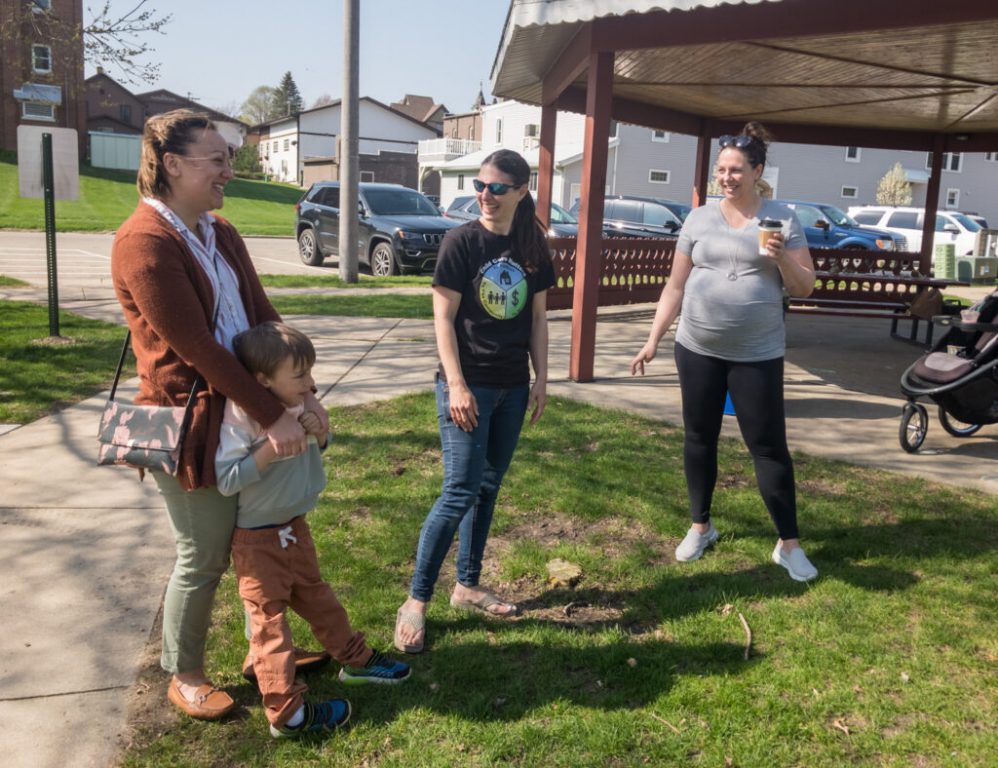‘Day Without Child Care’ Dramatizes Issue
Wisconsin among 25 states that participates in event pushing better pay for workers, more affordable care.

Corrine Hendrickson (center), owner and director of Corrine’s Little Explorers child care center and child care advocate, laughs with two parents of children who attend her child care center and spoke about how access to child care has affected their families at a “Day Without Child Care” event Hendrickson organized at New Glarus Village Park on Monday. Photo by Christina Lieffring/Wisconsin Examiner.
Nearly 300 child care providers in 25 states signed up for “A Day Without Child Care,” an event organized to call for living wages for child care providers, and equitable, affordable access to child care across the country.
For the parents who spoke at an event Monday morning at New Glarus Village Park, “a day without child care” wasn’t theoretical. Many spoke of significant life decisions they’ve made — where they live, where they work, if they work, and how many children they have — based on child care.
Bean and his wife, Kaylee Walters, moved to Austin, Texas, for graduate school, but soon after their first child was born they moved back to Wisconsin, partly due to the lack of child care.
“Wait lists were two years long, and they were outrageously expensive” in Texas, Bean said. “We had to work opposite shifts. I worked the night shift, I was in graduate school, my wife worked in the mornings, and we just traded off. It was one of the most exhausting times of our lives.”
Even after they moved back to Wisconsin, Bean and Walters had a 30-45 minute commute every day from New Glarus, where their children attended The Growing Tree child care center, to their jobs in Madison.
“As parents we’ve had to make decisions about leaving professions, leaving careers, quitting jobs so that we could make ends meet because we couldn’t afford to keep our kids in daycare,” Bean said. “These amazing child care providers saw our kids as much each week as we did. It feels criminal to me how under compensated they are for the incredibly important work that they do.”
Corrine Hendrickson, owner and director of Corrine’s Little Explorers and child care advocate, helped organize Monday’s event in order to keep child care front-of-mind for parents, businesses, government officials and voters as the fall election draws closer.
The fight for affordable child care and living wages for providers was brought into focus during the pandemic, but it isn’t new. Peggy Haack, a retired child care provider who worked from the mid-’70’s until 2013, was part of a teacher-led movement for adequate compensation for child care workers.
“And that was at a time when everyone that was doing this work was called a babysitter,” Haack said.
One of the outcomes of the movement was that research came out that “proved what we already knew” according to Haack: that better pay and better working conditions improved the quality of child care, and that higher quality child care had a long-term impact on academic and career success throughout the life of the child.
Haack is currently researching the history of the child care movement and found that the topic was at the forefront in the 1920’s and 30’s. But while other countries have found viable solutions, in the United States the issue has remained unresolved.
Hendrickson pointed out the importance of elections: child care providers are still in this fight because former President Richard Nixon vetoed universal child care in 1971. When Hendrickson and Brooke Skidmore, the director of The Growing Tree, approached the Department of Children and Families under former Governor Scott Walker’s administration about proposing legislation to increase funding for child care, the department stated that it could not respond whether or not it supported the proposal.
When they tried again under Gov. Tony Evers’ administration, the experience was “a complete 180” according to Hendrickson: they met with officials within a month and started working together on a proposal to help child care providers who work with students with disabilities. In February a bill was introduced by Sen. Jon Erpenbach (D-West Point), but the Legislature shortly after gaveled out for the year, and Erpenbach is retiring.
“Elections matter,” Hendrickson said. “The priorities of those we elect at the local, county, state and federal level matter.”
With the upcoming election, Hendrickson wants everyone invested in child care to get involved.
“We need to pay attention, show up at town halls, write, call and ask: Do you support investment in early care and education and child care? What does that look like to you? Do you support raising the wages and benefits of the educators so they can thrive? Do you support lowering out-of-pocket costs to parents?” Hendrickson said. “You don’t have to be an expert, you just have to show up. We need to pay attention and hold them accountable.”
‘Day Without Child Care’ spotlights importance for parents, employers and kids was originally published by the Wisconsin Examiner.




















